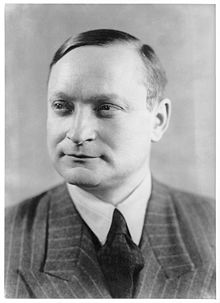Georg Leibbrandt | |
|---|---|
 | |
| Reichsamtsleiter Eastern Division NSDAP Office of Foreign Affairs | |
| In office October 1933 – Unknown | |
| Preceded by | Position established |
| Ministerialdirektor (from May 1942) Reich Ministry for the Occupied Eastern Territories | |
| In office November 1941 – 10 August 1943 | |
| Preceded by | Position established |
| Succeeded by | Gottlob Berger |
| Personal details | |
| Born | 6 September 1899 Hoffnungstal, Tiraspolsky Uyezd, Kherson Governorate, Russian Empire |
| Died | 16 June 1982 (aged 82) Bonn, North Rhine-Westphalia, West Germany |
| Nationality | German |
| Political party | Nazi Party |
| Alma mater | University of Tübingen University of Marburg University of Leipzig |
| Profession | Civil servant, scholar |
| Known for | Wannsee Conference participant |
| Military service | |
| Allegiance | |
| Branch/service | Kriegsmarine |
| Years of service | 1943–1945 |
| Battles/wars | Second World War |
Georg Leibbrandt (6 September 1899 – 16 June 1982) was a German Nazi Party official and civil servant. He occupied leading foreign policy positions in the Nazi Party Foreign Policy Office (APA) and the Reich Ministry for the Occupied Eastern Territories (RMfdbO) as an expert on issues relating to Russia. Both agencies were headed by Nazi chief ideologist Alfred Rosenberg. Leibbrandt was a participant at the 20 January 1942 Wannsee Conference, at which the genocidal Final Solution to the Jewish Question was planned. In the postwar period, criminal proceedings against Leibbrandt were initiated, but the case was ultimately dismissed.